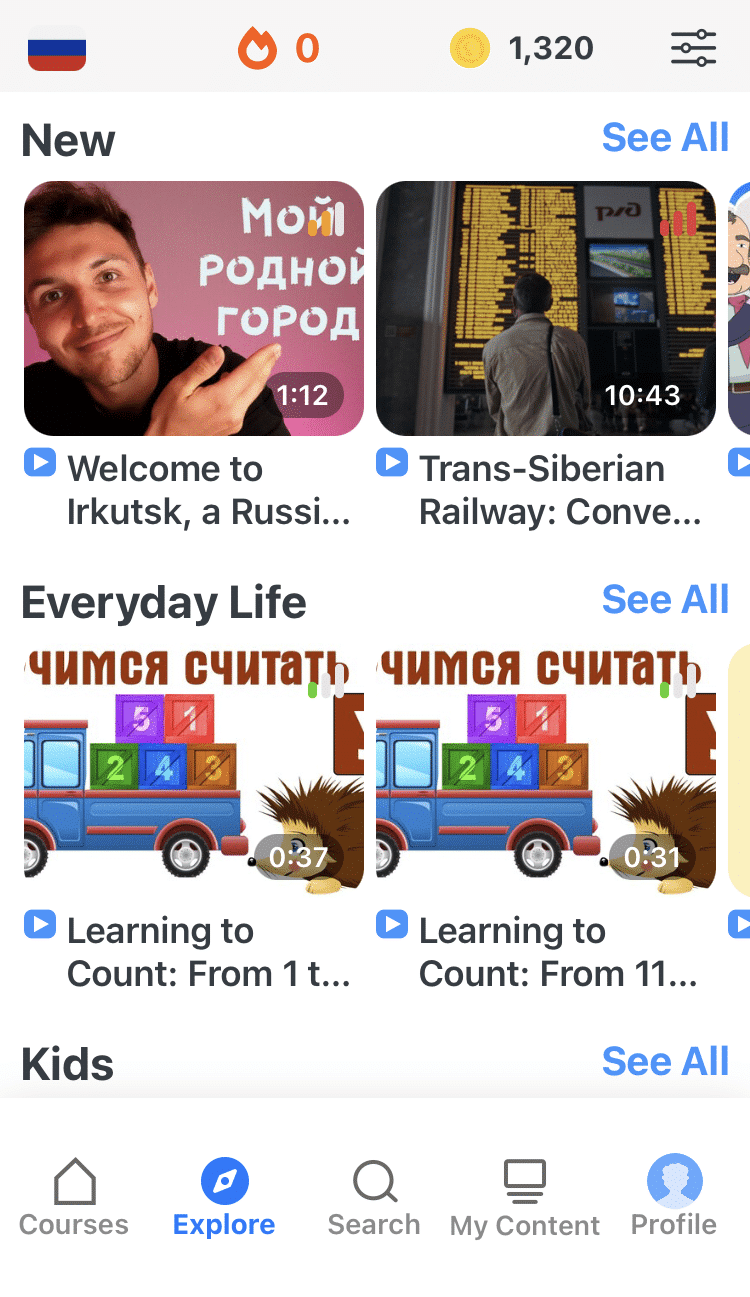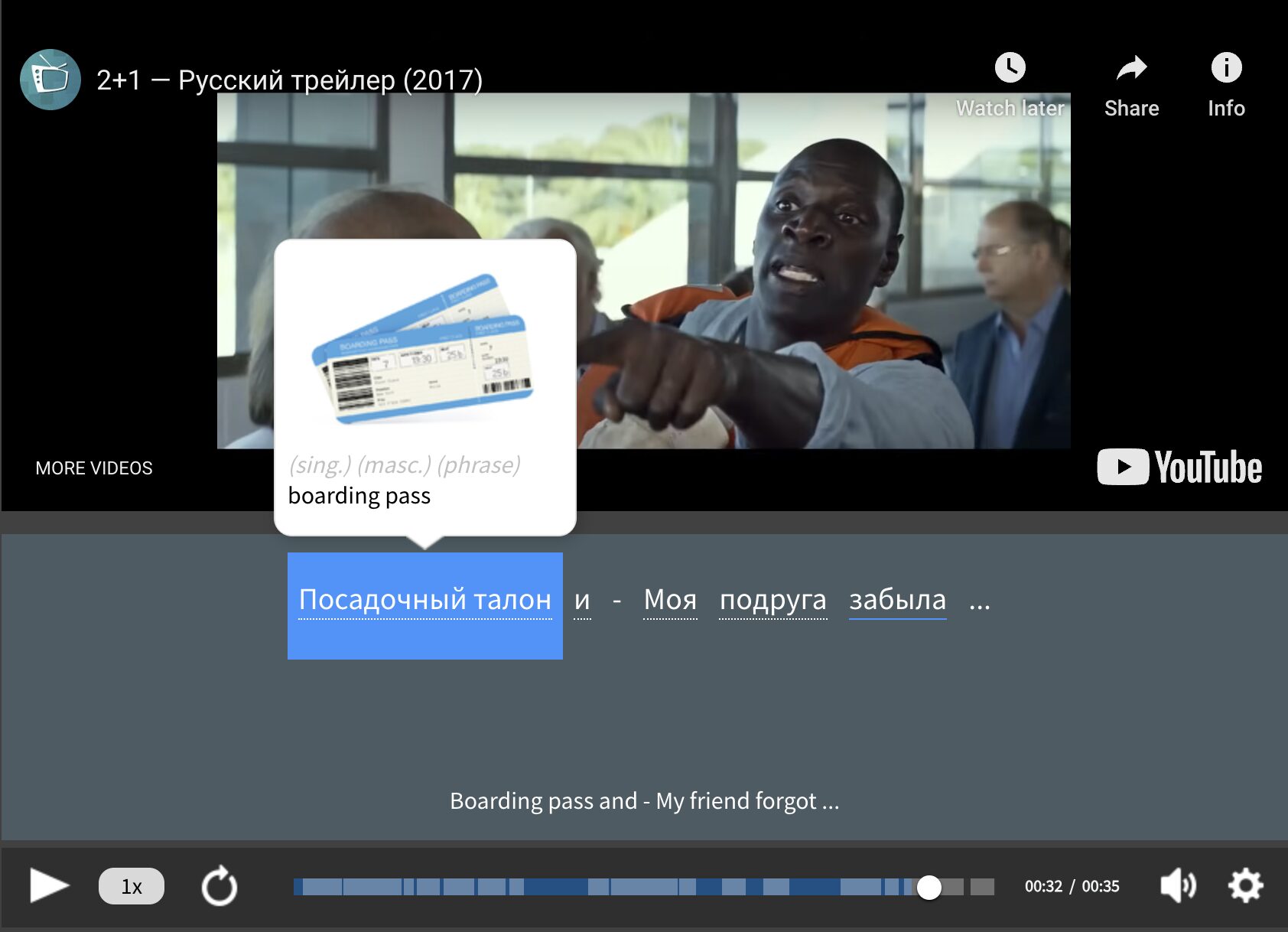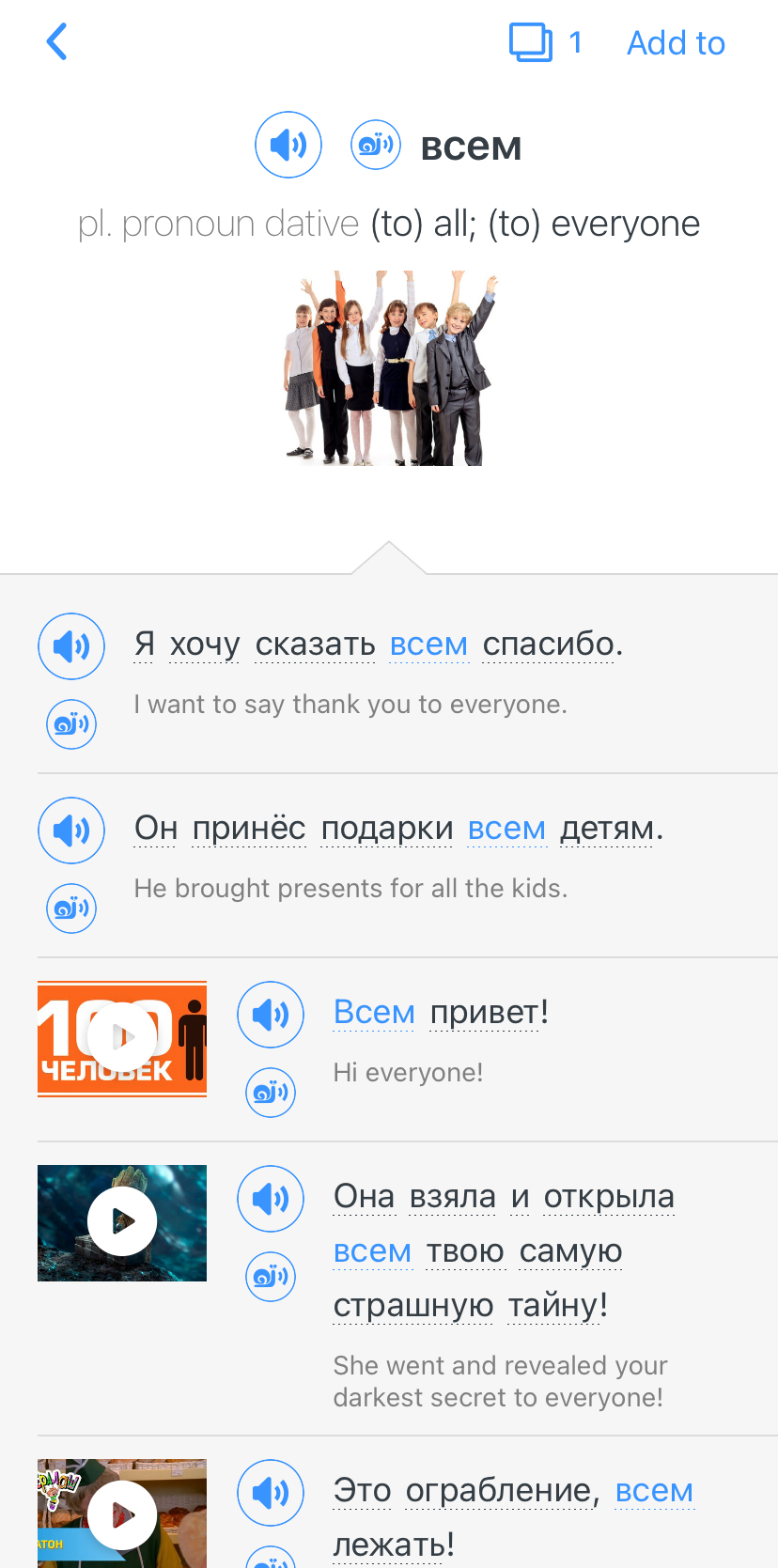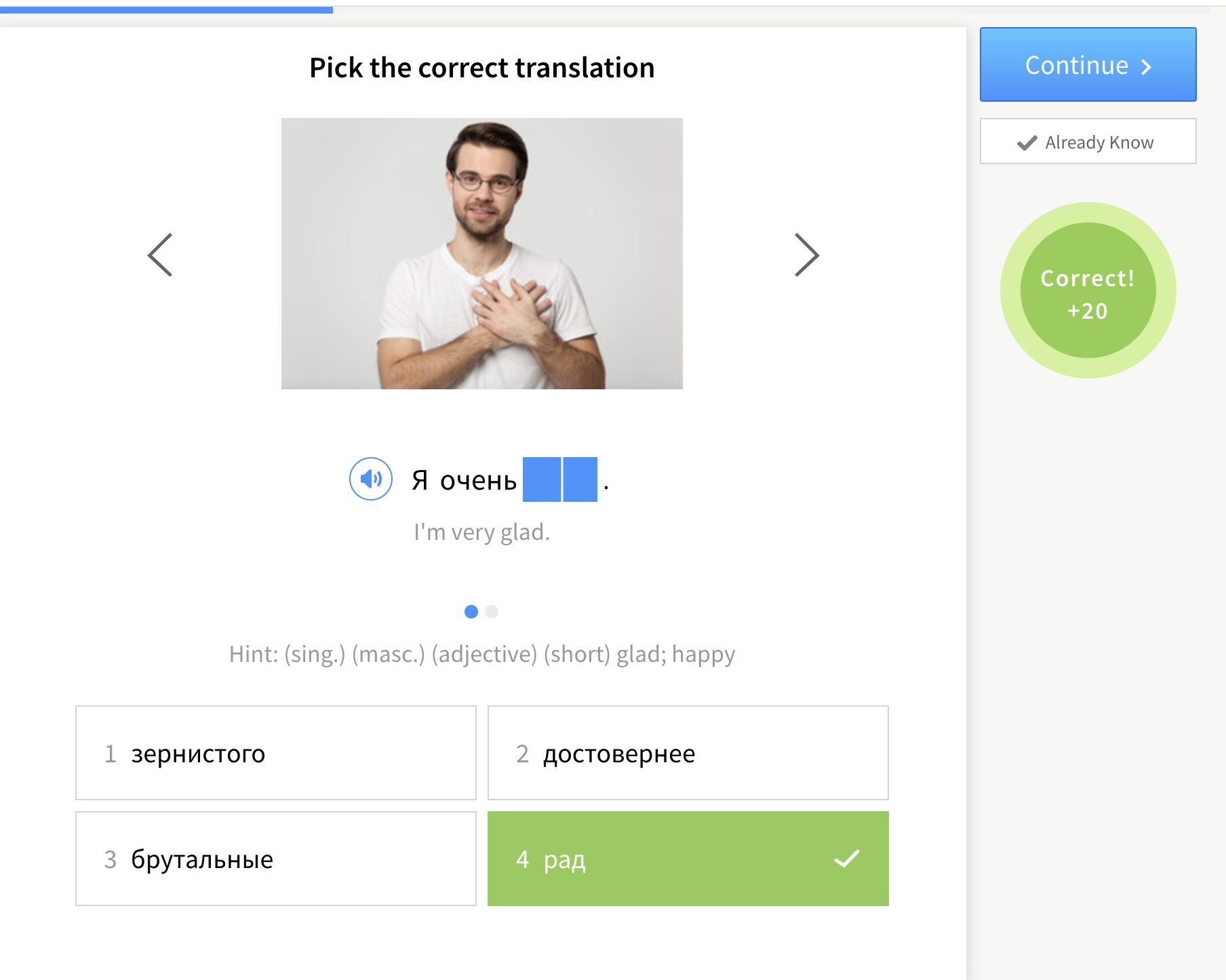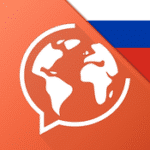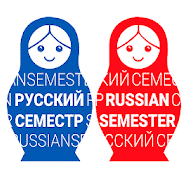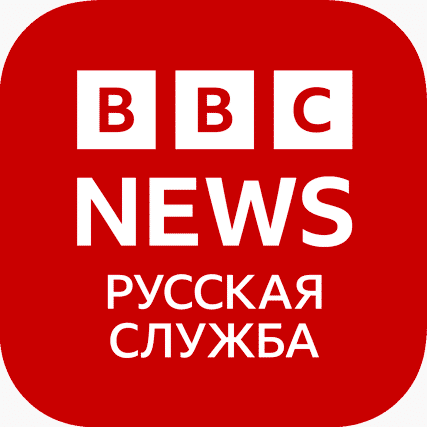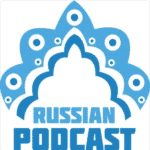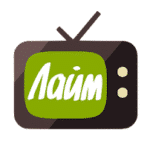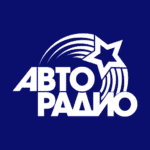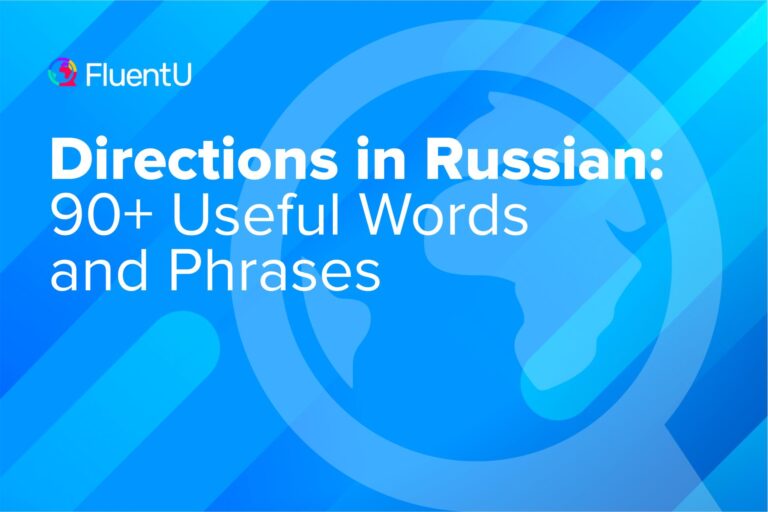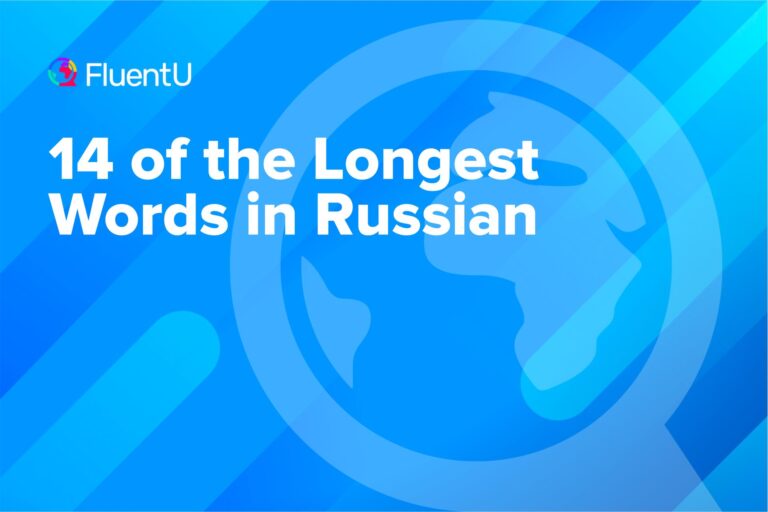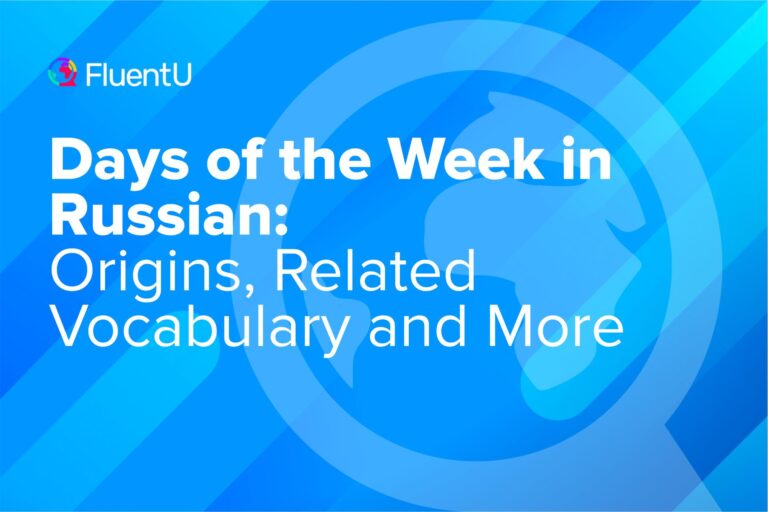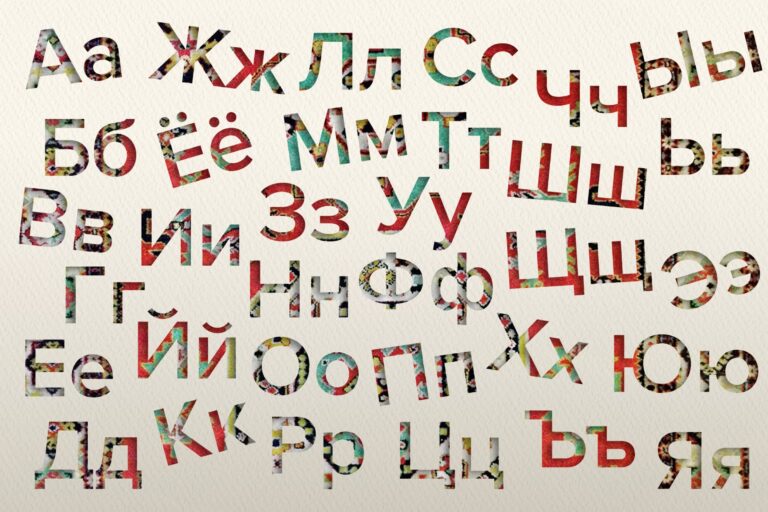Contents
- 1. Best for Learning in Cultural Context: FluentU
- Russian Immersion from Your Device
- 2. Best for Structured Learning: Busuu
- 3. Best for Casual Studying: Duolingo
- 4. Best for Quick Daily Study: Drops
- 5. Best for Spaced Repetition: Memrise
- 6. Best for Speaking Practice: Mondly
- 7. Best for Conversation Skills: Babbel
- 8. Best for Beginners Learning Cyrillic: Russian Cyrillic in 3 Hours
- 9. Best for Speech Recognition: Rosetta Stone
- 10. Best for Writing Cyrillic: Write It! Russian
- 11. Best for Learning Vocabulary: Learn Russian 11,000 Words
- 12. Best for Language Exchange: HelloTalk
- 13. Best for Grammar Explanations: LingoDeer
- 14. Best for Connecting with Natives: Tandem
- 15. Best for Personalized Flashcards: Anki
- 16. Best for Individualized Learning: LingQ
- 17. Best for Passing Russian Proficiency Tests: SemesterRus
- 18. Best for Learning Through News: BBC Russian
- 19. Best for Sentence Practice: Clozemaster
- 20. Best for Listening Practice: Russian Podcast
- 21. Best for Russian TV: Лайм HD TV (Lime HD TV)
- 22. Best for Russian Radio: Авторадио (Autoradio)
- 23. Best for On-the-go Exercises: Learn Russian – Beginners
- 24. Best for Learning with Russian Tutors: Preply
- What to Look for in a Russian App
The 24 Best Apps for Learning Russian in 2025
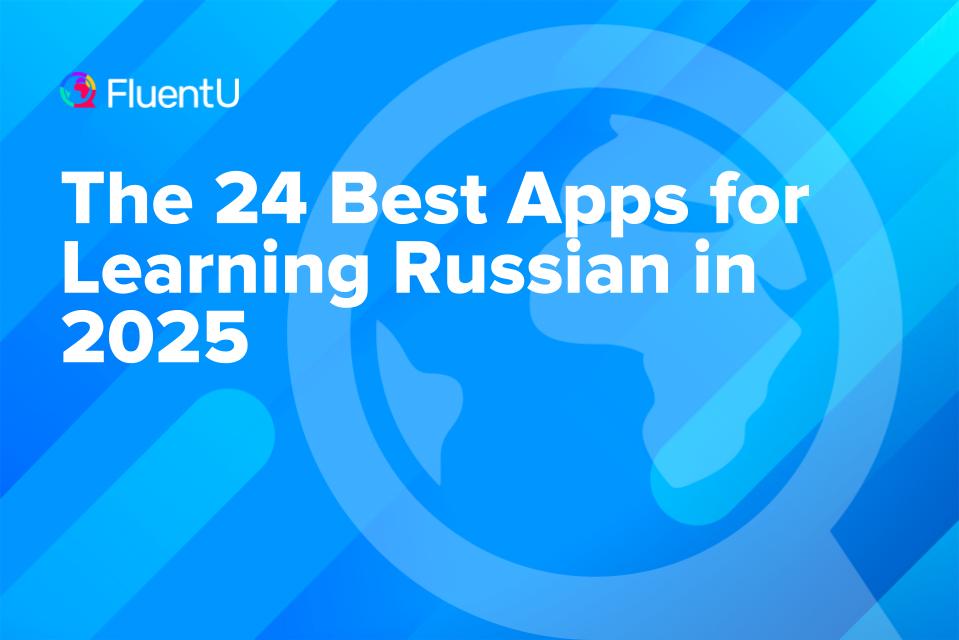
Apps can be a great addition to your Russian studies, but with so many options out there, finding the right app can take a lot of time.
I should know—I’ve downloaded and deleted more apps than I care to admit.
To spare you the struggle, I’ve found 24 of the best Russian learning apps for any level.
Download: This blog post is available as a convenient and portable PDF that you can take anywhere. Click here to get a copy. (Download)
| Best for | Resource |
|---|---|
| Best for Multi-tasking | Learn Russian Words Free |
| Best for Learning in Cultural Context | FluentU |
| Best for Structured Learning | Busuu |
| Best for Casual Studying | Duolingo |
| Best for Quick Daily Study | Drops |
| Best for Spaced Repetition | Memrise |
| Best for Speaking Practice | Mondly |
| Best for Conversation Skills | Babbel |
| Best for Beginners Learning Cyrillic | Russian Cyrillic in 3 Hours |
| Best for Speech Recognition | Rosetta Stone |
| Best for Writing Cyrillic | Write It! Russian |
| Best for Learning Vocabulary | Learn Russian 11,000 Words |
| Best for Language Exchange | HelloTalk |
| Best for Grammar Explanations | LingoDeer |
| Best for Connecting with Natives | Tandem |
| Best for Personalized Flashcards | Anki |
| Best for Individualized Learning | LingQ |
| Best for Passing Russian Proficiency Tests | SemesterRus |
| Best for Learning Through News | BBC Russian |
| Best for Sentence Practice | Clozemaster |
| Best for Listening Practice | Russian Podcast |
| Best for Russian TV | Лайм HD TV (Lime HD TV) |
| Best for Russian Radio | Авторадио (Autoradio) |
| Best for On-the-go Exercises | Learn Russian - Beginners |
| Best for Learning with Russian Tutors | Preply |
1. Best for Learning in Cultural Context: FluentU
Summary: FluentU teaches the language through video clips from authentic Russian media.
Russian Immersion from Your Device
I get it–learning Russian isn’t always a walk in the park. But it doesn’t have to be a boring, tedious, or hair-pulling experience either. In fact, making it fun is key to your success!
With FluentU, you can learn Russian naturally by turning any YouTube or Netflix video with subtitles into an interactive language lesson. I’m talking about language immersion from the convenience of your device.
You can even import your favorite YouTube videos into your FluentU account to learn from them using the app or website. Or browse our curated library of videos handpicked for beginners and intermediate learners.
While you watch a video, FluentU’s interactive subtitles let you tap on any word for an instant definition, example sentences, images, and audio. No more pausing and searching for translations—everything you need is right there!
It's all built to help you learn how to use words in real contexts. And as you learn, you can add new words to your flaschards with just a click! For example, if I tap on the word всем, this is what pops up:
Learn even faster with built-in quizzes that reinforce vocab from every video. FluentU tracks your progress, gives you extra practice with tricky words, and reminds you when it’s time to review—so your learning is always personalized and effective.
Try FluentU today on your computer or tablet, or download our app from the App Store or Google Play. Click here to take advantage of our current sale! (Expires at the end of this month.)
Pros:
- Contextual dictionary with video and audio support
- Learn the language as it’s actually spoken by native speakers
Cons:
- Only some features are accessible offline
- No direct access to native speakers
2. Best for Structured Learning: Busuu
Summary: Busuu offers a complete Russian language course that will take you from the alphabet to full conversations.
The app provides a placement test when you sign up to help you determine where to start learning.
The free version gives you access to interactive activities and quizzes.
If you decide to pay for Busuu Premium, you’ll get offline capabilities, review sessions and grammar lessons.
Premium Plus includes additional features like a personalized study plan, conversation practice and the ability to earn official certification in Russian language studies.
Busuu is a nice app for anyone who likes the traditional classroom setting but doesn’t have the time or money to attend a course.
Pros:
- Full, structured course
- Can take you from beginner to intermediate
Cons:
- Need to pay to access full features
- May not have much for advanced learners
Read our full Busuu review here.
3. Best for Casual Studying: Duolingo
Summary: Duolingo teaches you Russian with games and bite-sized lessons.
Duolingo uses sentence-building exercises, translations and other gamified methods to teach you the language in a fun way.
Although Duolingo does technically go beyond the beginner level of Russian, the app is fairly simple.
It’ll teach you a good foundation in the Russian language, but you won’t become fluent using Duolingo alone.
The app is free, but you do have the option to subscribe to Duolingo Plus and get offline access, more lives and no ads.
Pros:
- Fun, easy learning
- Great for language practice
Cons:
- Not a lot of content past the beginner level
- Not well-rounded in all four language skills
If you’re interested in using Duolingo, I recommend reading our in-depth Duolingo review first.
4. Best for Quick Daily Study: Drops
Summary: Drops aims to teach you as much new vocabulary as possible in five minutes a day.
This is best for beginners as it focuses entirely on vocabulary.
The app provides illustrations for each vocab word to help you remember the term.
Drops focuses on vocab and topics you’re most likely to encounter if you travel to a Russian-speaking country.
You can learn Russian with this app for free, though a premium account gives you access to numerous bonus features.
Pros:
- Fun and easy
- Not very time consuming
Cons:
- No focus on anything other than vocabulary
- Not really for levels beyond beginner
You can read more about Drops in this detailed review.
5. Best for Spaced Repetition: Memrise
Summary: Memrise is a flashcard-based program with great spaced repetition software.
Memrise uses gamified teaching methods along with some traditional techniques to teach you the language.
The SRS technology spaces out vocabulary words in a way that’s scientifically proven to help you remember them best.
Memrise also tries to create an immersive experience, incorporating more structure into its program as well as authentic videos from real Russian speakers.
Memrise is free to download and use, but paying for Memrise Pro gives you bonuses like offline access, reviews of your learning history and a wider variety of activities.
Pros:
- Great spaced repetition software
- Authentic content from Russian speakers
Cons:
- Not much focus on writing or speaking
- User-made decks can have errors
You can check out our full Memrise review here.
6. Best for Speaking Practice: Mondly
Summary: Mondly focuses on conversational Russian by teaching you how to form sentences quickly.
With Mondly, you’ll learn practical vocabulary and sentence structure, hear native accents and practice pronunciation.
Mondly even has a speech recognition feature to help you improve your pronunciation and accent.
Mondly also has other cool tech features like a chatbot, augmented reality learning and even a virtual reality option.
The app is free to download and includes a limited number of lessons, one new lesson per day, weekly quizzes and monthly assessments.
If you want access to more lessons and features (including the speech recognition tool), you can sign up for Premium.
Pros:
- Great for speaking practice
- Fun, innovative features
Cons:
- Have to pay if you want more than one free lesson a day
- Some features aren’t fully developed
Here’s our full Mondly review if this app has piqued your interest.
7. Best for Conversation Skills: Babbel
Summary: Babbel offers 10- to 15-minute lessons focused on helping users learn practical conversation skills.
The app has exercises to improve your listening, speaking, reading and writing skills.
There’s a speech recognition feature you can use to help you boost your pronunciation.
Additionally, the focus on both grammar and vocabulary will give you a well-rounded Russian education.
You can try the first lesson for free. This is a great way to see if you like the format before spending money on a paid subscription to the app.
Pros:
- Quick sessions
- Well-rounded
Cons:
- Have to pay beyond the first lesson
- Not much for advanced learners
If you want to learn more about Babbel, bookmark our full Babbel review here.
8. Best for Beginners Learning Cyrillic: Russian Cyrillic in 3 Hours
Summary: This app is great for learning the Cyrillic alphabet quickly.
Users praise this app for its easy instruction and making the alphabet easy for English speakers to understand.
The app even explains how certain Russian words are similar to English words.
Its focus on contextual learning and real-world examples will help you see the alphabet in action and understand the importance of knowing it well before you actually start learning Russian.
Due to its limited scope, Russian Cyrillic in 3 Hours is best suited for beginners, and it’s really meant as a supplemental resource.
Russian Cyrillic in 3 Hours is completely free.
Pros:
- Contextual learning
- Great for beginners
Cons:
- Only teaches the alphabet
- Not great beyond the beginner level
9. Best for Speech Recognition: Rosetta Stone
Summary: Rosetta Stone uses many tools to teach you Russian with immersion-based techniques.
With the help of exercises that include images and native Russian audio, it uses spaced repetition to teach you vocabulary and grammar.
Rosetta Stone has a fantastic speech recognition engine and reading section.
They are very focused on immersion, so lessons are entirely in Russian.
Rosetta Stone is a good app for beginner Russian learners who already know the basics and want to learn some extra vocabulary while listening to native Russian speakers.
Pros:
- Speech recognition
- Lots of immersion
Cons:
- Expensive
- Only really good up to intermediate level
You can read our full Rosetta Stone review here.
10. Best for Writing Cyrillic: Write It! Russian
Summary: This app focuses on teaching you how to write the Cyrillic alphabet.
With this app, you will learn how to write words, sentences and even complex paragraphs.
This app’s guide breaks down writing in Russian step-by-step and stroke-by-stroke.
It also offers audio clips so you can match the words with pronunciation and rewards for your learning.
Pros:
- Teaches you to write in Russian
- Uses handwriting recognition to correct mistakes
Cons:
- Doesn’t provide practice for other language skills
- Audio can sound robotic
11. Best for Learning Vocabulary: Learn Russian 11,000 Words
Summary: This app uses flashcards and games to help learners pick up new vocabulary.
Since the focus is entirely on vocabulary, this is great for intermediate-level learners who already know the grammar basics but want to discuss a wider array of topics.
Vocabulary is grouped thematically and there are seven levels and over 120 topics and subtopics.
The first few lessons are free. After you’ve completed them, you’ll have to buy a subscription to continue learning.
Pros:
- Lots of vocabulary available
- Games make learning fun
Cons:
- Have to pay after a few lessons
- Doesn’t work on any other language skills
12. Best for Language Exchange: HelloTalk
Summary: HelloTalk puts you in touch with native Russian speakers to find a language exchange partner.
The app allows you to search for a language exchange partner according to their native language, location, learning profile and even age.
I’d consider this one better for intermediate students since it mostly focuses on conversational exchange, so you’ll need to know the basics.
The app includes several useful tools to help you with your learning process. You have machine translation, transliteration, text messages, audio messages, voice and video chat and even text-to-voice (AI).
There is also a pretty active community that you can interact with to ask and answer questions and find more friends!
Pros:
- Conversation practice
- Build connections with natives
Cons:
- Sometimes, you’ll have to sift through the users who are there for the wrong intentions
Check out our in-depth HelloTalk review here.
13. Best for Grammar Explanations: LingoDeer
Summary: LingoDeer teaches you Russian from scratch with a well-organized course.
You can learn about several different topics in Russian as well as the alphabet and some handy phrases.
There’s a lot of great cultural information and grammar explanations, making LingoDeer a great option for intermediate learners.
Each lesson includes a lot of exercises that allow students to learn grammar rules and new words easily, and there are also sections to target their reading and speaking skills specifically.
Pros:
- You can learn from scratch
- There are cultural tips
Cons:
- No video material
- Not much for advanced learners
Interested in using LingoDeer? Read our detailed review here.
14. Best for Connecting with Natives: Tandem
Summary: Tandem will connect you with language partners for language exchanges.
Language exchanges are becoming more and more popular because they’re a free way to practice the language you’re learning with a native speaker.
Tandem is the aesthetically pleasing alternative to HelloTalk.
My favorite Tandem feature is the group chats. Just select the language partners you want to have in the group and start chatting!
You can obviously only choose people that are already on your friend list, but I find this feature very useful for practicing a language in a more realistic environment (a group convo).
Pros:
- Connects you with natives
- Visually pleasing interface
Cons:
- Not much more for learning tools
If you’re thinking about using Tandem, I highly recommend checking out our full Tandem review here.
15. Best for Personalized Flashcards: Anki
Summary: Anki is a great resource for creating your own flashcards as there’s so many customizable features.
Anki is completely personalizable with options for different flashcards, audio, images, explanations, translations and almost anything else you can think of.
The app also allows you to share the decks you create and learn with decks created by other users.
There are hundreds of flashcard decks to learn Russian.
Many of them include native audio and/or images, and they’re often updated since users keep adding flashcards to their decks.
Pros:
- Customizable features
- Spaced repetition software
Cons:
- Can be difficult to navigate at first
- No language learning-specific features
Read all about how (and if) Anki really works in our deep dive review here.
16. Best for Individualized Learning: LingQ
Summary: LingQ has several features that center around personalization and the use of native examples.
LingQ promises to let you learn languages with real Russian content, and it pretty much always delivers.
You just have to choose your level of Russian and search a key word, or pick from the over 550 courses and 18,500 Russian lessons the app includes.
Each lesson includes a transcription of an audio clip read by a native Russian speaker along with definitions and flashcards.
You can review by doing exercises with your spaced repetition flashcards (multiple choice, cloze tests, dictation or just plain flashcard flipping).
The app also offers Russian tutoring and proofreading/correction services for a price.
Pros:
- Offers tutors
- Uses native writing and audio
Cons:
- Can feel overwhelming
- Not much grammar or speaking practice
Click here to read our full review of LingQ.
17. Best for Passing Russian Proficiency Tests: SemesterRus
Summary: SemesterRus is the perfect app to prepare for the Test of Russian as a Foreign Language (TORFL).
This free app can be used by any student regardless of their level. However, the material included is demanding, so complete beginners might feel very lost.
There are three levels included in the app (A1, A2 and B1) and they are divided into several lessons that revolve around dialogue read by a native speaker.
After the dialogue, there are several subsections where students can learn the vocabulary and grammar of the lesson, do exercises and test themselves.
There’s also an exam section, which is devoted to practicing for the TORFL exam. It contains exercises similar to the ones included in the exam.
There is also a dictionary section, which contains a deck of flashcards with Russian audio, English translations and sample phrases/sentences.
Pros:
- Prepares you for the standardized Russian language exam
- Great for serious learners
Cons:
- Not much for advanced students past level B1
18. Best for Learning Through News: BBC Russian
Summary: BBC Russian allows you to read about Russian and international news in the language.
British Broadcasting Corporation (BBC) is one of the most respected news sources out there.
Thanks to the BBC Russian app, you can access the same high-quality news content in Russian.
Explore topics ranging from economics and science to sports and fashion.
Additionally, you can practice your listening comprehension skills in the Βидео (Video) section.
BBC Russian is ideal for advanced students who want to crank up their reading skills.
Pros:
- Free
- Can read about something important in Russian
Cons:
- May have bias
- No language learning-specific tools
19. Best for Sentence Practice: Clozemaster
Summary: This app uses sentence mining and cloze tests to help you learn Russian sentences.
Clozemaster gives you almost 20,000 sentences in Russian and you decide how you want to learn them.
All exercises are based on cloze tests, but you can choose which skill to practice:
- Vocabulary: You get flashcards of sentences where a word is missing.
- Speaking: It looks similar to the Vocabulary section, but you can record your voice. The speech recognition system will write what it hears, so you can check how close (or far) you are from the answer.
- Listening: Before you do the cloze test, you get to listen to the whole Russian sentence. This section is obviously perfect for practicing your listening comprehension.
While you’re learning, you can see the percentage of mastery you’ve acquired for each sentence.
You can also edit the flashcards, add notes, mark sentences as “Mastered” or tell Clozemaster to ignore certain sentences altogether.
Pros:
- Helps you learn Russian sentence structure
- You can choose how you want to learn
Cons:
- Not best for beginners
- Could have more writing practice
20. Best for Listening Practice: Russian Podcast
Summary: Russian Podcast is a superb way for advanced students to practice their listening skills and improve their Russian pronunciation.
Through these podcasts, you will get to know about topics such as spices, clothes, books, horoscopes and much more!
Tatiana, the host of the podcast, will help you learn Russian in a completely immersive way as episodes are completely in Russian.
When there’s a word she considers difficult, she’ll explain it with simpler words, but she’ll never give you a translation. All you’ll hear is native Russian!
I think advanced students can benefit the most from this podcast with the full immersion.
The podcast is free, but you can buy thematic transcript bundles.
You can also make a donation to get a PDF document with a ton of translation exercises from English and French into Russian with solutions.
Pros:
- Immersive method
- Listening practice
Cons:
- No practice for other language skills
- Can feel overwhelming for very beginners
21. Best for Russian TV: Лайм HD TV (Lime HD TV)
Summary: With this app, you can access Russian TV and immerse yourself in native content.
With Lime HD TV, you get access to over 300 free Russian channels as well as hundreds of movies, series and cartoons.
Whether you’re interested in news, nature, romance, action, shopping or entertainment, you’ll find something to watch anytime, anywhere.
The majority of the reviews I’ve read say the audio and video quality of the service is fantastic. Enjoy!
Pros:
- Native TV
- Lots of free options
Cons:
- No supporting learning tools
- Have to pay for some movies
22. Best for Russian Radio: Авторадио (Autoradio)
Summary: This app will let you listen to native Russian radio on the go.
For those of you who love listening to the radio while having a relaxing cup of coffee, cleaning the house or commuting to work, I couldn’t finish this list without including an app to listen to the radio.
Autoradio includes content for almost any type of student.
There’s a lot of Russian music, news, sports and even programs about cars.
You will hear mostly music on the radio, but there are bits of Russian dialogue interspersed between songs.
Pros:
- Can listen on the go
- Can hear native speech
Cons:
- No supporting material
- Mostly music
23. Best for On-the-go Exercises: Learn Russian – Beginners
Summary: This app teaches you Russian vocabulary from scratch.
The levels start extremely basic, assuming you’ve never studied Russian before. The more you practice, the more advanced the words get.
You’ll start with units like the alphabet and “greetings,” and solidify your new vocabulary with tons of practice quizzes and exercises.
The content review feature also lets you revisit words you’ve learned to make sure you haven’t forgotten them.
One of the best parts is that the app is 100% free, so you’ll never have to pay to access more features. Plus, you can use the app while offline.
There are also tests for practicing your reading, writing and listening skills.
Pros:
- Use the app without Internet or WiFi access
- It’s 100% free
- Can adjust the speed of the native speaker audio
- Offers basic, beginner, intermediate and advanced levels
Cons:
- Works best as a supplemental resource—the content won’t get you to fluency or teach you enough Russian on its own
- Categories are locked until you’ve completed the previous one, so you can’t choose the order you study in
- Some users find there are lots of useless or irrelevant words
24. Best for Learning with Russian Tutors: Preply
Summary: Preply is a website that connects you to hundreds of qualified Russian tutors.
When searching for tutors, you can set your own price range to find teachers that are within your budget (which could be as low as $3-4 an hour).
You can also choose their country of birth, such as Russia, Ukraine or Kazakhstan.
Tutors also list their specialties, such as “Russian for Beginners,” “Conversational Russian,” “Intensive Russian” and more.
Each tutor has an introduction video on their profile, their availability, qualifications and reviews from other students so you can choose the right fit.
Once you think you’ve found one, you can book a trial lesson before deciding to buy a package of 6, 12, 20 or any other amount of lesson hours.
Pros:
- Set your budget and find affordable tutors for you
- Schedule lessons according to your own availability
- Choose from over 500 Russian tutors
- Save new words from your classes
- Ask tutors to assign you homework if wanted
- Option to schedule weekly recurring lessons or single lessons
Cons:
- You can’t pay for lessons as you go—you have to purchase a package of hours
What to Look for in a Russian App
So you’ve looked over this list and now want to download a Russian app. How do you know which app you should get?
Here are some pointers:
- Think about which skill(s) you want to develop. Some of the apps on this list help you build multiple Russian language skills, while others focus on just one or two.
- Choose an app that suits your learning style. Everyone learns in different ways. Flashcards aren’t necessarily for everyone. Neither are audio clips without text. Choose an app that will work with your learning style.
- Make sure it’s suited for your learning level. Are you an advanced student? Then you wouldn’t want to download an app that meets your learning style and targets your desired skills… only to discover all the material is pretty basic.
- Check out in-app purchases. If you really want the features that paid subscriptions or purchases provide, consider investing in the app. It’ll pay off in the long run, with improved Russian skills!
With so many great options for Russian learning apps, you’re sure to find something out there that works for you!
So, hop onto your phone and start learning!
Download: This blog post is available as a convenient and portable PDF that you can take anywhere. Click here to get a copy. (Download)

